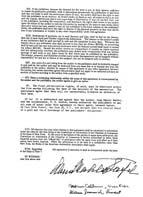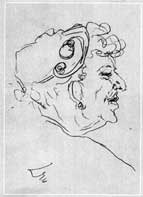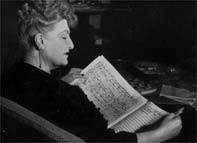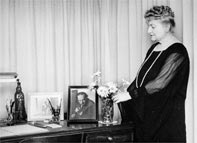| The curse of Alma's Autobiography Paulus Manker
When talking about Alma, all the time it sounds to me like a description of a very pleasant, intelligent, really worthy woman. How it comes that the image which survived, mainly through her autobiography and through interviews, the image that survived is so different. Because according to Alma´s "fama" she has not been a very pleasant person. Most people prone to make a fool out of Alma. But how you descibe her, the opposite is the case.  |  |  | 
left: Alma's contract for her autobiography
right: Alma in America (caricature by Dolbin) | Joshua Sobol
If I thought that she should be made a fool of, I would not even dream of writing one scene about her. I think her bad luck is her autobiography, or the way she dealt with her biography, which is a grotesque story. She tried to cover up facts, she tried to rearrange her biography, to wipe under the carpet certain unpleasant stories, and to ornament her lifestory. And that was, of course, a terrible mistake, which had to do with her mentality. There is some, I would say "Kitsch" value in Almas "Weltanschauung". Otherwise she would not care, she would not even bother to ornament her biography. On the contrary, she would have told her story in a bold way, and it could have made a great book. If she really told us the truth. But I think she was ashamed of many things. That´s obvious, she felt ashamed of certain affairs or events in her life. Because she was, in a funny way, sticking to old values when coming to judge her own life. And she wanted to leave us with a very idyllic description of her life. I don´t understand how she could have imagined that all these famous persons - who were her husbands and her lovers - didn´t leave behind them notes, letters that will be researched, and exposed to the last detail. And that´s what happened with persons like La Grange, for exampel, who researched Mahler´s life in such great detail that it´s obvious that he knows about Mahler much more than Mahler knew about himself. And La Grange does not leave one inch or one millimeter, which is not exposed to the fiercest light. So, when you put Alma´s pitiful attempts to cover up certain facts in her life against the light, which is now shed on her biography by Mahler´s biographer, so by Kokoschka´s biographer, so by Gropius" biographers - let alone the fact that Gropius kept copies of the letters that he has sent to Alma, alongside with the letters that he recieved from Alma, and she probably didn´t know that he was a maniac of order - so everything is there. And then her autobiography becomes a document which tells a lot about her naivity, in a way. And I think that she must have been very naive to believe that she could canalize the story of her life without exposing herself to the accession that she was a liar.  |  |  | 
left: Alma with a score of Gustav Mahler
right: Alma with the picture of Franz Werfel | Before I started to write the play I read about her, I pondered about her, and became, so to speak, "pregnant" with her personality. And I felt a lot admiration to her courage. Because it deserved a lot of courage from a young woman at that time to do what she did. First of all to throw away her entourage, and opt for Mahler. Then betray Mahler with a guy like Gropius, and doing it almost in the open. And then in the open go with Kokoschka without even dreaming of a marriage with him. Doing what she did with Werfel while she was married to Gropius. And even that courage then, when she was already eleven years older than Werfel, to pick him up as her next husband. She had no respect for bourgeois - or petit bourgeois - taboos. And this in itself makes of her quite a person you have to respect. That boldness, that courage of hers to follow her feelings, and to live up to her feelings. She did not make any compromises when it came to her human contacts. When she loved someone she did not care about anything. She went to her love. And that is a lot in a society which was so ridden with conventions, and with mediocrity, and with compromises. I don´t think she made any compromises when she chose her lovers or her husbands. I think that proves that she was a very bold person. And I have a lot of respect for that. < An epitomy of the 20th century
> The encounter between Mahler and Freud |
